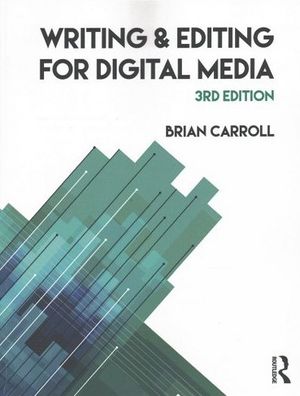| 58774 & 59513 | NMAC 3108.01–.02 | Online | Summer, 2019 |
|---|
Writing for Digital Media teaches writing skills for a digital age. This project-oriented course will focus on collaborative editing.
Digital media differs from that of print in several key ways, and because of these differences, to use digital media successfully, writers must develop specific skills for its mastery. A project-oriented course, NMAC 3108 introduces students to these skills, encourages them to practice an online professionalism, provides multiple opportunities to develop digital literacies, and teaches them to become fluent practitioners of new media. As this section of WritDM is taught fully online, please be sure you are aware of the implications before attempting it.
Introduction
Welcome to NMAC 3108, Writing for Digital Media. The document you’re reading is your syllabus. Everything you need for this class is on this page and linked off of it. Bookmark it now and return here if you get lost or confused.
Please read this document and those it links to carefully at the beginning of the semester. There is much information to process, and it can be somewhat daunting — especially if you read cursorily. If you are confused, do your best to work through it by (re)reading this document carefully and completely, searching this site, or consulting the FAQ. I promise, there is an answer to your question. If all else fails, you may contact me. Trust yourself to follow directions and find the answers. Be careful and deliberate.
Also, use this syllabus as a model for how you should approach digital writing as a college student and a professional.
This course will probably be unlike any college course you have ever taken. It is designed to let you — the students — discover and create your own knowledge using the powerful digital devices and platforms we all have access to. I’m assuming, since you’re taking this class online, that you are comfortable with working by yourself, are confident in your ability to take risks, do not need the constant reassurance of an authority figure, and have a basic Internet literacy. You will learn more about my approach shortly. Please enter with an open mind. If you’re curious to know more right now, you might want to read my teaching philosophy and peruse the articles under HackEdu.
If you are uncomfortable making decisions, researching your own answers, working on your own, or you get frustrated easily, you may be more comfortable in a traditional, face-to-face section of this course. |
Again, read this document through carefully before beginning. You might want to take notes as you go, jotting down questions you have. I bet they are answered by the time you’re ready to begin the first lesson.
This course does not use D2L/Brightspace. Everything you need is posted on this site, WikiEdu.org, or Wikipedia. You will sign up for a Wikipedia account and join the class on WikiEdu in your first lesson . |
Instructor Information
| Gerald R. Lucas | |
|---|---|
| Office | CoAS-117 (Macon campus), Department of Media, Culture & the Arts |
| Office Hours | See Contact |
| gerald.lucas [at] mga [dot] edu | |
I try to make myself as available as much as possible during the first couple weeks of a semester, including evenings and weekends. If you need to chat with me, email me and we’ll arrange a video conference via Skype (or similar service), if necessary. Please do not expect a response after 5pm on weekdays or anytime during the weekend. I may be available, but I also need some down time. Thanks for your understanding.
Goals
In this course, you will use lessons, texts, and daily practice to improve your writing for the screen while developing your online, professional persona. Specifically, students will develop:
- writing skills most appropriate for several platforms on digital media;
- a professional persona that targets a specific expert community; and
- a collaborative sense of composition.
You will read, write, and workshop (discuss each other’s work online for the purpose of improvement). Though this class teaches you how to target a digital audience and the basics of how to publish writing for the web, it is not a technology class; it is primarily a writing class, though we will address various digital media throughout. That said, our primary concern is writing, not the tech we do it with.
Again, if you are uncomfortable researching and figuring out some things on your own, this may not be the section of NMAC 3108 for you. |
Student Learning Outcomes
By successfully completing the course, students will demonstrate:
- the ability to analyze and evaluate issues in new media and communication;
- proficiency writing for the web; and
- proficiency collaborating on a writing project.
Materials

Required Texts
- Carroll, Brian (2017). Writing and Editing for Digital Media (3rd ed.). New York: Routledge. ISBN 978-1138636033.
Recommended Texts
- Barr, Chris (2010). The Yahoo! Style Guide: The Ultimate Sourcebook for Writing, Editing, and Creating Content for the Digital World. New York: St. Martin's Griffin. ISBN 978-0312569846.
- Lynch, Patrick J.; Horton, Sarah (2008). "The Web Style Guide" (3rd ed.). Retrieved 2019-04-15.
Requirements
Writing for Digital Media is composed of the following components; each is detailed in the tabs[1] at the top of the page or by following the links below:
- RQ1: Wikipedia Contributions (50%)
- RQ2: Journal (30%)
- RQ3: Participation (20%)
Each requirement will be on-going throughout the semester, will require regular contributions, and be comprised of various assignments.
Students must complete all assignments in each requirement to successfully pass the course. |
Projects you complete online should be able to stand alone; that is, assignments should not reference the class, but target a particular professional audience. Remember, these are public documents, not just assignments; your audience, if you’re considering yourself as part of an expert community, is not necessarily your classmates and professor.
Please read each project at the beginning of the semester, so you have an understanding of what will be expected of you during the semester. Some assignments will take longer to complete than others. Work a bit and practice every day — do not procrastinate.[2]
Policies
Students are held accountable for knowing and practicing each of the following course policies. Consider them like the law: the excuse “I didn’t know” will carry no weight. In addition, students are responsible for reading, understanding, and adhering to all Middle Georgia State University student policies, including those linked on the Syllabus Policy page.[3]
Students may withdraw from the course and earn a grade of “W” up to and including the midterm date. After midterm, students who withdraw will receive a grade of “WF.” Students are encouraged to read the withdrawal policy before dropping/withdrawing from class.
Assignments and Deadlines
Your work represents you. Everything you turn in for evaluation should exemplify the very best of your professional self. Late work is unacceptable and will receive a zero. Technical problems do not excuse late work. Plan ahead and turn in your work on time. Last-minute work submissions are ineligible for revision for a higher grade.
Attendance
Attendance for online courses is based on consistent participation. While students may work within lessons at their own pace, there will be assignments and milestones due regularly, usually each week. In other words: students are required to submit work each week to remain in good-standing. I recommend working a bit every day for consistency and to facilitate learning. Any registered student who does not submit work the first week will be counted as a no-show. Large gaps in participation (more than a week of not working) will be grounds for failure.
Communication
Communication is integral to success, no matter what we’re talking about. In a digital world, these literacies are particularly important. Not only should you develop and perfect your communication skills while in college, you need to use those skills everyday with your peers and professors.
Evaluation
Evaluation depends on overall student performance: on the successful completion of all requirements, regular participation, and positive attitude. Some requirements are weighed heavier in evaluation, but all are essential to successfully complete the class. Letter grades are based upon a traditional ten-point scale. Grades for this class will be based on the point system.
Plagiarism
Plagiarism is serious academic misconduct. Willful or accidental plagiarism—including using AI tools to generate assignments—will result in assignment failures, potential class failure, and will be pursued to incite the utmost penalty for such dishonesty.
Research
All writing in this course should be supported with both primary (readings I assign you) and secondary (sources you find yourself) texts. All suppositions must be supported with evidence, whether they appear on a forum post, a blog post, a Wikipedia article, or class discussion. In other words: research is an integral component of everything you do in this course. Any ideas that are not supported might as well not be written.
Technology Requirements
All students should have a newish computer with dependable Internet access. A tablet for reading PDFs is convenient, but not a requirement of the course. Students should check the course site daily for updates. Students are responsible for working out all of their technical difficulties.
Schedule
This schedule represents the ideal outline for our study this semester. Yet, like all best-laid plans, we may not be able to keep up with our agenda. Please be flexible and try to look and read ahead whenever possible. We will do our best to stick by this schedule, but I will inform you verbally whenever there is a change in or an addition to an assignment. Getting these updates is solely your responsibility. Therefore, this schedule is tentative and subject to change contingent upon the needs of the students and the professor, and dictated by time and other constraints which may affect the course. This schedule reflects only an overview of the assigned reading and other major course assignments. It may not indicate specific class session assignments or activities. Specific assignments are often given in class.
Course Overview
The following is just a general outline of the course activities. More details are provided in the tab[4] for each week located at the top of the page.
| W1 | May 28 – June 2 | Introduction to Digital Writing and Wikipedia |
| W2 | June 3 – June 9 | Evaluating Wikipedia |
| W3 | June 10 – June 16 | Selecting a Topic and Drafting |
| W4 | June 17 – June 23 | Editing an Article |
| W5 | June 24 – June 30 | Peer Reviews |
| W6 | July 1 – July 7 | Writing and Editing |
| W7 | July 8 – July 14 | Revising and Improving |
| W8 | July 15 – July 22 | Final Article and Reflective Essay |
Notes
- ↑ Denoted as RQ1—RQ3.
- ↑ Seriously, procrastination is likely the cause of 95% of failures in this course. You must work consistently and carefully each week to be successful.
- ↑ See the MGA website's Syllabus Policy Page the policies linked thereon.
- ↑ W1–W8.


